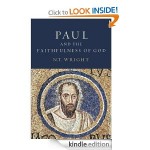Tom’s exegesis on pp. 870ff. of Gal. 3.19-22, and it brings to light his reasoning about why Paul thought the Law seemed to have failed. Tom says it was no fault of the Law itself, the fault lay entirely in the sinfulness of Israel. He puts it this way “Torah offered life, it could not give it– not through its own fault, but through the sinful human nature of Israel”. But this is not entirely correct. Even the Law given to Adam could not give him everlasting life. That’s why there was a tree of life in the garden as well as a tree of the knowledge of good and evil. No, the problem was not just the sinfulness of Israel. The problem was only the Spirit of God can give life, and when one looks to the Law to do something it couldn’t do by its very nature, it was always a mistake. The Law could inform God’s people of what was right, but it could never ever enable them to have everlasting life.
Tom however is absolutely right that Paul does not in any way suggest the Law was not a good thing. The reference to it being delivered by angels to God’s people is not in any way a negative comment, as Tom stresses (see Dt. 33.2 (LXX); Ps. 68.17 (LXX); Jub. 1.27-29; Acts 7.38,53; Heb. 2.2).
On p. 872– Tom here suggests that what is really criticized in 2 Cor. 3 is not the Mosaic ministry or the Mosaic covenant but rather just the hard-hearted Israelites, who stand in contrast with the new covenant people of God. This is not quite correct. Yes, the Israelites who had hard hearts are indeed critiqued here. But so is the Mosaic covenant itself as well. The Letter killeth but the Spirit giveth life is a comment on the Mosaic ministering of the Torah to God’s sinful people and its effect on them, as opposed to the effect of the ministry of the Spirit on God’s new covenant people. Likewise at Gal. 3.20 he takes ‘Moses is not the mediator of the one’ to be a reference to how he could not mediate or bring about the one family of God, because the Law divides Jews from Gentiles. God is one, and that is why he wanted one family. This line of approach makes good sense. As does his treatment of the paidagogos where he follows my treatment in Grace in Galatia.
Tom is likewise correct that Paul is working against the ‘agitators’ precisely because he wants the church to be a unity of Jew and Gentile in Christ, and that means among other things the attempt to make all become Jews through keeping the Torah will not do, since Gentiles are accepted in the new covenant as they are on the basis of faith in Jesus. So Tom says “One! That was the point of the chapter from 3.15 right through to 3.29; that was the key element on which so much turned, as it was the key point that Paul was most anxious to convey to Peter at Antioch and to the Galatians in writing this letter. Paul does not, of course, mean that all ethnic, social,and gender distinctions cease to have any meaning at all. In many places in his writing he is clear that one must still learn how to behave wisely within these as within other structures.” (p. 875). But the day is gone where a covenant that deliberately distinguished Jew from Gentile, male from female (by the very covenant sign which only males could have), and slave from free could be what defined the people of God.
Tom goes on in the following pages to an exposition of Gal. 4.1-11.
He is right, contra Martyn, that Paul thinks of a long lead up to the coming of Messiah, a chronological sequence leading to ‘when the time had fully come’. While it is true that the Messiah came from above, and so in that sense intruded into the time space continuum, this does not mean there was not a long process through which the people of God had to go through first, while being under the pedagogue, and under-age. Tom also stresses that chronos is used here, a sequence of time, not the mere kairos, or propitious moment kind of time. This same kind of notion is found, as Tom says in 4 Ez. 4.36-37; 11.44.
On pp. 876-78, Tom stresses that he sees Exodus motifs here in the reference to slaves. But this is unlikely, for the enslavement he has in mind comes not from being in Egypt, but from being a sinner! And the Law only makes it worse, turning sin into trespass. No, there is no Exodus discussion in Gal. 3-4. The Law was given after the Exodus anyway, and the covenanting which it involved is not carried over from the Abrahamic covenant. It is a ‘new’ covenant that is made with Moses and his people.


















